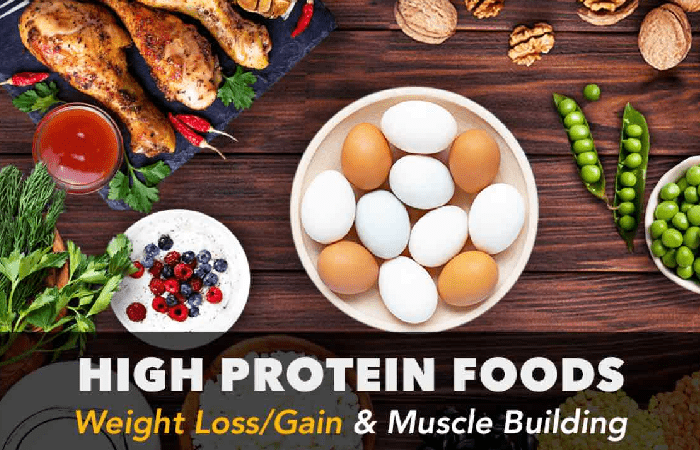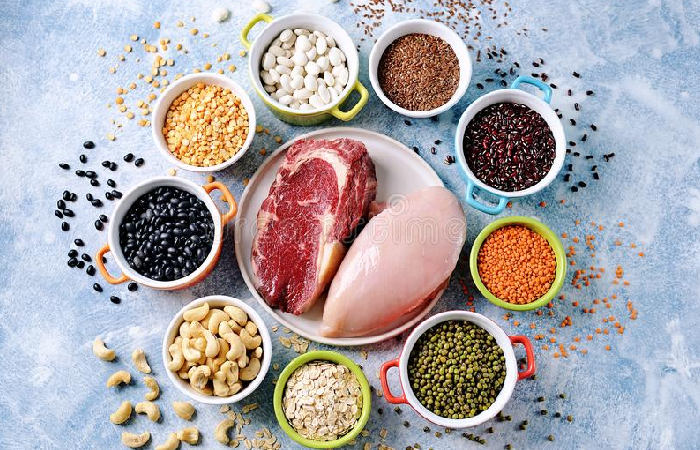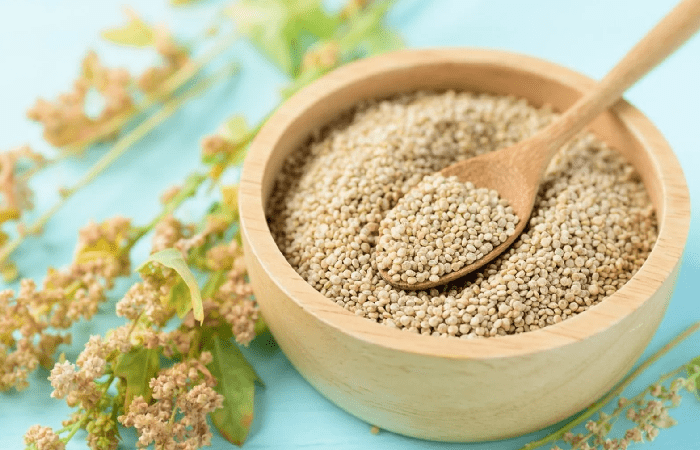20 Best High-Protein Foods For Weight Loss, Satiety, And Muscle Gain
For our general health and well-being, foods high in protein offer a number of advantages. Including high-protein foods in your diet can help you achieve your nutritional needs and advance your objectives, whether you want to lose weight, gain muscle, or just keep your health in check.

In the pursuit of a robust, well-toned physique and the realization of fitness aspirations, the significance of proper nourishment is paramount. Protein emerges as a vital component of a wholesome dietary plan, with studies showcasing its effectiveness in catalyzing weight reduction, enhancing the sensation of fullness, and facilitating muscle development.
For individuals contemplating the integration of a plethora of protein-rich edibles into their daily consumption, a diverse array of alternatives awaits. From animal-derived provisions such as lean meats and dairy derivatives to plant-centric selections encompassing nuts, seeds, and legumes, there is an abundance of palatable and nutrient-dense protein sources to indulge in.
Scientific investigations have underscored the advantages of incorporating protein-dense, carbohydrate-sparse foods into one's eating regimen. In addition, they often provoke diminished glycemic reactions when juxtaposed with their high-carbohydrate counterparts. Such benefits are particularly relevant for those contending with insulin insensitivity or diabetes. Consequently, to elevate personal well-being and realize fitness objectives, including protein-abundant sustenance in one's diet is prudent.
What Are High Protein Foods?
Protein-rich nourishments, abundant in essential nutrients, possess substantial concentrations of proteins that facilitate muscle development, hormonal regulation, and the fortification of the immune system.
Prime sources of high protein content include lean meats such as poultry, fish, and turkey and plant-derived alternatives like quinoa, lentils, and legumes.
Incorporating these protein-rich foods into our daily nutritional regimen is paramount, as they confer myriad health advantages that bolster our comprehensive well-being and fitness objectives.
Irrespective of your status as an athlete striving for muscle augmentation, a vegan exploring plant-based alternatives, or simply an individual desiring to preserve optimal health, integrating high protein nourishments into your dietary plan can effectively address your nutritional requirements and facilitate a health-conscious lifestyle.

Need For High-Protein Food?
Protein, a vital macronutrient, is indispensable to many physiological processes, encompassing muscular development and restoration, immune system efficacy, hormonal balance, and beyond.
-
Consuming adequate protein-dense nourishment is imperative to satisfy daily requirements and uphold optimal well-being.
-
Selecting appropriate protein sources is equally significant, as specific alternatives may contain extra fats and sugars, potentially diminishing their advantageous properties.
-
Given the wide variety of choices at one's disposal, ensuring sufficient protein intake within one's dietary regimen is feasible.
-
Nevertheless, it is crucial to recognize that particular individuals may possess unique protein requisites due to age, physical exertion, or medical circumstances.
-
As such, seeking counsel from a qualified healthcare practitioner or accredited dietitian can facilitate the attainment of the precise quantity and variety of protein tailored to your distinct necessities.
-
Incorporating protein-abundant sustenance into your dietary plan is fundamental for preserving exceptional health and bolstering your fitness aspirations.
How will Protein Rich Food Help In weight loss Sateity And Muscle Gain
Integrating nutrient-dense, protein-rich sustenance into one's dietary regimen can yield beneficial results for shedding excess pounds and augmenting muscular development.
- Empirical research demonstrates that edibles characterized by elevated protein and diminished carbohydrate content typically generate more subdued glycemic reactions than those with a higher carbohydrate concentration, rendering protein-abundant foods a great inclusion in any diet oriented towards weight reduction or muscle enhancement.

-
Moreover, consuming protein-laden fare can amplify sensations of fullness and satisfaction, discouraging excessive food intake and supporting weight loss efforts.
-
Consuming protein-rich foods can also help increase muscle growth and improve athletic prowess.
-
High protein diets have been associated with decreased calorie consumption, weight loss, and long-term reductions in adipose tissue.
-
Including protein-rich foods in one's diet can be a great way to promote overall health and wellness while achieving weight loss and muscle growth goals.
It warrants mentioning that sustained adherence to a high-protein diet may harm the kidneys, particularly in individuals already experiencing kidney dysfunction. Consequently, seeking counsel from a healthcare professional before undertaking any substantial modifications to one's dietary habits is imperative.
20 Best High-Protein Foods
1. Breast of organic chicken
21 grams of protein per 3 ounces.
-
One chicken breast has more than 30% of the daily recommended requirement for protein, making it a great high-protein item that is simple to incorporate into nutritious lunch and dinner recipes.
-
Niacin and vitamin B6 are two more B vitamins found in chicken that are crucial for treating diabetes, lowering LDL cholesterol, and reducing your chance of developing cardiovascular disease.
-
Choose organic chicken breast to guarantee that the chicken was fed organic food farmed without the use of pesticides, given no antibiotics, and had access to the outdoors.
2. Sardines
22 grams of protein are in 4 ounces of sardines.
An incredible 22 grams of protein are elegantly ensconced within the palatable confines of 4 ounces of sardines. These little marvels of the aquatic realm are endowed with a cornucopia of vital nutrients, including Omega-3 fatty acids, calcium, phosphorus, vitamin D, B vitamins, selenium, and protein.
Sardines, oh sardines! They are a splendid piscine creation that is financially attainable and ecologically sound. Moreover, they stand alone as a veritable treasure trove of naturally occurring Omega-3.
This substance has been shown to confer various benefits, such as mitigating inflammation, sustaining cardiovascular well-being, and fostering cognitive aptitude.
Ah, but let it not be said that their value ends there, for sardines are also considered among the premier piscine staples for regular consumption. So, if you seek to enrich your dietary repertoire, look no further than the magnificent sardine!
3. Ground Beef
3 ounces provide 22 grams of protein.
-
Verily, a mere three ounces doth endow you with the bountiful riches of twenty-two grams of protein!
-
Indeed, few can match the noble and esteemed grass-fed beef amongst the pantheon of foods that confer a plethora of proteins.
-
Behold, not only does it furnish thee with a veritable cornucopia of protein, fulfilling nearly half of thy daily requirements, but also it boasts a wealth of vitamins A and E alongside potent antioxidants.
-
In truth, this beef's protein-laden and heart-healthy fat composition has been demonstrated by rigorous inquiry to lower the likelihood of developing heart disease while simultaneously elevating blood sugar levels.
4. Lamb
3 ounces of lamb have 25 grams of protein.
-
Behold, a most remarkable and awe-inspiring fact to behold! Forsooth, 3 ounces of lamb, that most noble of meats, doth contain a most prodigious amount of 25 grams of protein, verily a veritable bounty of this essential nutrient!
-
Furthermore, let it be known that the lamb doth provides us with several vital elements, such as iron, zinc, and vitamin B12, which nourish and sustain us in body and soul. Indeed, it doth possess a most excellent source of protein, the likes of which would surely impress even the most learned of scholars.
-
However, it doth behoove us to note that the lamb doth contains a fair amount of fat, especially the saturated variety, much like unto its bovine brethren of the grass-fed type.
-
Yet let it not be said that this fat is entire without benefit, for it doth contain conjugated linoleic acid (CLA), which is linked to advantages such as increased satiety and assistance with weight management.
-
Verily, may this knowledge be forever etched upon our minds, and may we ever be grateful for the lamb's bounty, that we may partake of its goodness and be sustained in both body and spirit.
5. Salmon - Caught Wild
17 grams of protein per 3 ounces.
-
For every triumvirate ounce allotment of untamed aquatic Salmon, an impressive magnitude of 17 grams of protein is attainable, establishing it as an exceptional proteinaceous reservoir.
-
Moreover, this piscatorial delight is a highly endorsed alternative for those questing for salubrious, protein-rich sustenance, given its copious presence of omega-3 fatty acids alongside a vast spectrum of vitamins and minerals, such as the illustrious vitamin B12.
-
Upon consumption of a trifecta of ounces in salmon proportion, one is endowed with almost an entire recommended daily quota of vitamin D, selenium, and vitamins B3, B6, and B5, as well as the elemental potassium, all of which are indispensably crucial for maintaining peak corporeal vigor.
-
Furthermore, it is noteworthy that this particular proteinaceous source is impeccably suited for individuals adhering to a ketogenic dietary schema by its propitious fats.
-
In addition, the nutritional attributes of Salmon yield extensive advantages for the holistic welfare of the human organism, encompassing cerebral, skeletal, cardiac, ocular, dermal, and cellular dimensions. As such, it is fervently advocated for those pursuing a comprehensive and nourishing dietary blueprint.

6. Eggs
Two sizable eggs provide 14 grams of protein.
-
Eggs contain a comprehensive amino acid profile and healthy fats.
-
They eggs are one of the best high-protein, low-carb foods.
-
Eggs contain nine necessary amino acids that humans must obtain from their diet.
-
Eat more eggs to improve skin health, weight loss, metabolic syndrome prevention, and heart health.
-
Eggs are also a good source of biotin, which aids with better protein absorption.
-
vitamin B6 is also crucial for the absorption of proteins.
-
It aids in the breakdown of proteins by enzymes and transports the broken-down amino acids to the blood.
7. Tempeh
15 grams of protein are in 3 ounces of tempeh.
-
A remarkable 15 grams of protein can be found in a mere 3-ounce serving of the exquisite tempeh, which originates as a plant-based protein derived from the fermentation of soybeans.
-
The distinguished tempeh boasts a uniquely nutty flavor profile and presents a delightfully firm texture that differentiates it from its counterpart, tofu.
-
Tempeh is a protein-rich food that also includes a range of other minerals, including probiotics, antioxidants, isoflavones, manganese, copper, phosphorus, and magnesium.
-
Tempeh is a superb complement to any health-conscious diet since these priceless minerals and antioxidants work in unison to strengthen bone health, lower cholesterol levels, and delicately manage blood sugar.
8. Natto
15 grams of protein is present in half cup of natto.
-
A voluminous 15 grams of protein can be found in a mere half-cup serving of natto, a delectable fermented treat.
-
Natto is meticulously crafted by steam-cooking whole soybeans and subsequently introducing an assortment of advantageous microorganisms, resulting in a distinctive fermented delicacy.
-
This nutrient-rich treat contains protein, manganese, iron, copper, magnesium, vitamin K, and vitamin C, among other vitamins and minerals.
-
Natto has an exceptional nutritional profile, and individuals who like its distinctive flavour may benefit from a wide range of health advantages.
9. Cottage Cheese
14 grams of protein is present in 12 cup of cottage cheese.
-
A considerable 14 grams of protein can be found in a mere 12 cups of cottage cheese, making it an incredibly potent source of this vital nutrient.
-
Cottage cheese shares similarities with Greek yogurt, as both boast impressive amounts of protein even when consumed in small quantities.
-
Esteemed by athletes and proponents of low-carbohydrate diets alike, this low-calorie, protein-rich dish offers vital components such as calcium, which contribute to its widespread popularity.
-
Together with calcium, cottage cheese's considerable phosphorus content is essential for supporting the development and upkeep of strong bones.
-
In addition, cottage cheese is a great source of folate, vitamins B12 and B6, and other nutrients that are essential for supporting the proper growth of the brain, neurons, blood cells, and other tissues.
10. Kefir
Protein content per cup is 10 grams.
-
Kefir, often known as "drinkable yoghurt," is a cultured dairy product that provides probiotics, calcium, potassium, and other nutrients.
-
It generally contains more probiotics than yoghurt. It also has a tarter taste.
-
Due to their high protein content, calcium content, and other nutrients, research suggests that yoghurt and kefir are excellent high protein diets for weight loss.
-
For the maximum advantages, choose organic, plain (no sugar added), full-fat kefir, just like with yoghurt.
11. Navy beans (white beans)
13.5 grams of protein is in half a cup.
-
One can find an impressive 13.5 grams of protein in a half-cup serving.
-
Considering your body can efficiently digest beans; it can reign particularly as one of the most nutritious, high-protein, low-fat food options.
-
As a powerhouse of nutrients; white beans boast significant amounts of folate, thiamine, potassium, magnesium, and iron while maintaining a low glycemic index.
-
In culinary creations, white beans can seamlessly substitute potatoes and tofu, yielding delectable and healthful results.

12. Lentils
9 grams of protein is present in half a cup.
-
A substantial 9 grams of protein can be found within a mere half-cup serving.
-
Those adhering to vegetarian or vegan dietary preferences can successfully achieve sufficient protein intake by incorporating lentils into their meal plans.
-
Lentils stand as an exemplary source of plant-derived protein.
-
One cup of lentils is rich in nutrients, including protein, fiber, folate, manganese, iron, phosphorus, potassium, and a variety of B vitamins, among others.
-
Its protein-rich composition, along with its diversified nutritional profile, not only benefits heart health, digestion, and blood sugar management. It also helps with pH balance, alkalization, and general well-being.
13. Nutritional Yeast
Protein content in 2 tablespoons is 8 grammes.
-
Nutritional yeast is a favourite among vegans and vegetarians for its cheese-like flavour (despite being completely devoid of dairy), as well as its high levels of B vitamins, zinc, fibre, and vegan protein.
-
On combining cane and beetroot molasses, nutritional yeast is cultivated before being fermented.
-
It can be purchased in the form of yellow flakes, granules, or powder, and is frequently used to season food or improve the flavour and texture of soups and sauces.
14. Brown Beans
Half a cup contains 7.5 grams of protein
-
A serving size of one-half cup provides an impressive 7.5 grams of protein.
-
Individuals adhering to vegetarian or vegan lifestyles can enjoy black beans as a substantial protein-rich alternative.
-
Black beans offer an excellent combination of fiber and protein, contributing to satiety and maintaining balanced blood sugar levels, thereby preventing fluctuations.
-
The inclusion of protein and fiber in black beans facilitates the body's absorption of essential nutrients and the dispersal of acids into the bloodstream.
-
Consuming black beans not only bolsters one's energy levels but also promotes a healthy and efficient digestive system.
15. Liver (beef or chicken)
Protein content per ounce: 7 grams.
-
What makes liver consumption beneficial for health?
-
Due to the extraordinary abundance of essential minerals, specifically vitamin A, iron, and B vitamins (notably B12), cow, chicken, and duck liver are esteemed as superfoods across numerous cultures.
-
A number of researchers posit that, when compared on an ounce-for-ounce basis, the liver potentially surpasses other high-protein foods in terms of nutrient density.
-
By incorporating liver into your dietary regimen, even in modest quantities, you may prevent anemia, bolster cognitive well-being, encourage fertility, facilitate detoxification processes, and reap numerous other health advantages.
16. Almonds and Nuts
6 grams of protein in 1 ounce (23 almonds).
-
In a single ounce, comprising approximately 23 almonds, one can find an incredible 6 grams of protein.
-
These delicious nuts are an excellent plant-based protein source, ideal for vegans.
-
Almonds' nutritional profile encompasses protein, antioxidants, dietary fiber, and heart-healthy unsaturated fats.
-
The unique nutrient content of almonds extends to vitamins such as riboflavin and vital minerals like magnesium.
-
Almonds deliver an extensive array of well-being enhancements, encompassing the alleviation of inflammatory responses, fortifying cognitive prowess, fostering dermal vitality, modulating glycemic equilibrium, and conferring indispensable safeguarding against cardiovascular afflictions.
-
If ingesting almonds or alternative nuts in their unadulterated form isn't particularly appealing, contemplate indulging in nourishment-laden nut-based spreads, like almond butter, peanut butter, or cashew butter, a viable option for incorporating a protein-abundant component into your dietary repertoire.
17. Yoghurt
6-9 grams of protein is present in 6 ounces of yoghurt.
-
An impressive concentration of 6 to 9 grams of protein is found in merely 6 ounces of yogurt, making it a veritable powerhouse of nutrition.
-
Yogurt stands out as a remarkable source of protein, fats, carbohydrates, essential vitamins, and minerals, all contributing to its nutritional profile.
-
Moreover, yogurt is brimming with probiotics that bolster digestion and optimize nutrient absorption by nurturing the bacterial ecosystem in your gastrointestinal tract.
-
The exceptional combination of probiotics and high protein content in yogurt can aid in weight loss, enhance mood, and fortify the immune system, making it a desirable snack option.
-
This is precisely why yogurt containing probiotics is celebrated as a superfood. For those seeking alternatives to the prevalent Greek yogurt, options prepared from goat or sheep's milk are available.
-
Yogurt offers a versatile substitution for mayonnaise and sour cream in a wide assortment of culinary preparations.
-
Additionally, yogurt serves as a nourishing and wholesome breakfast choice for health-conscious individuals.

18. Quinoa
8 grammes of protein can be found in one cup (185 grams) of cooked quinoa.
-
A generous provision of 8 grams of protein is encompassed within a single cup (equivalent to 185 grams) of sumptuously prepared quinoa.
-
Recognized as a plant-derived protein powerhouse, quinoa simultaneously boasts a rich profile of fiber and indispensable amino acids.
-
As a rarity among plant-based sustenance, quinoa stands as a complete protein, signifying the presence of all nine essential amino acids that are integral to the human body.
-
Replete with both soluble and insoluble fiber varieties, quinoa promotes optimal digestion and mitigates the risk of developing specific health conditions. A single cup of cooked quinoa incorporates an impressive 5 grams of fiber.
-
Quinoa is endowed with a substantial presence of vital nutrients, including vitamin B6, folate, thiamin, and vitamin E.
-
Additionally, quinoa features an abundance of essential minerals, such as iron, zinc, phosphorus, and magnesium.
-
Consuming one cup of impeccably cooked quinoa provides approximately 30% of the daily recommended intake of magnesium, a vital mineral for maintaining cardiovascular health, regulating blood sugar levels, and ensuring robust bone health.
19.Chickpeas
Each cup of chickpeas contain 15 grams of protien
-
Garbanzo beans, another name for chickpeas, are. They are rich in Protein, fibre, vitamins, and minerals.
-
They aid in weight loss as they are an excellent source of fibre and protein.
-
Chickpeas are an excellent source of plant-based protein.
-
They have a high protein content when cooked.
-
Soluble and insoluble fibre present in chickpeas aids in digestion, lowers cholesterol levels and also lowers the risk of development of many diseases.
-
vitamins B6, folate, thiamin, and K are also present .
-
chickpeas also contain large amounts of Iron, phosphorus, magnesium, and zinc.
-
Iron is required for the formation of Red blood cells and the synthesis of energy. Since chickpeas contain it , it aids in the formation of both.
20. Goat Cheese And Other Raw Cheese
Protein content per ounce: 7 grams.
-
Goat cheese is made from healthy goat milk, which is simpler to digest since it includes A2 casein protein (instead of A1 casein, which is present in cow's milk).
-
Cheeses with high protein content per serving, such feta and goat cheese, also aid in nutritional absorption and supply medium-chain fatty acids, which increase energy and aid in cholesterol lowering.
Conclusion:
-
You can choose from a variety of protein sources, such as plant-based sources like quinoa, lentils, and beans, as well as foods derived from animals, such as lean meats, chicken, fish, and dairy items.
-
Always consult a healthcare professional before you adopt any considerable changes in your diet.
-
Also, remember that prolonged use of a protein-rich diet can have adverse effects.
-
your health is your greatest wealth take care of it.



